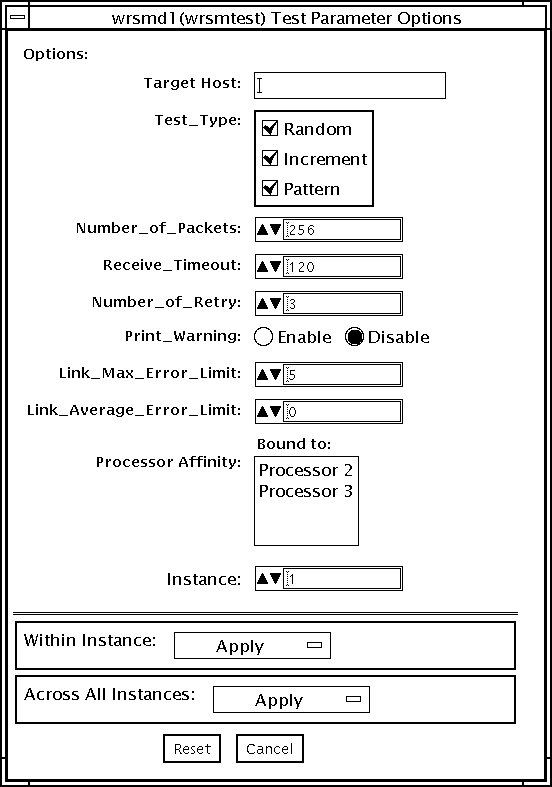Chapter 61 High Performance Interconnect Test (wrsmtest)
The wrsmtest verifies the functionality of the Sun High Performance Interconnect by checking the cluster networking hardware.
Note -
For this test to be meaningful, the cluster must be configured before the test is run.
The wrsmtest uses the Internet Control Message Protocol (ICMP) that is based on the Data Link Protocol Interface (DLPI) to test the connections between cluster nodes.
First, wrsmtest determines the target cluster nodes to use for testing. You can specify the target hosts in the wrsmtest Test Parameter menu, or if no targets are specified, wrsmtest sends an ICMP broadcast from the private cluster network to find them. If it fails to find the necessary targets, it performs an RPC broadcast to the RPC port mapper daemon.
After finding the cluster nodes (targets), wrsmtest performs the following subtests:
-
Random test--sends out 256 packets with random data length and random data.
-
Incremental test--sends out packets with length from minimum to maximum packet size using incremental data.
-
Pattern test--sends 256 packets of maximum length, where each packet contains one test pattern where all byte patterns (0 to 0xFF) are used.
Note -
wrsmtest is a scalable test. The maximum number of instances is two per WIB card.
Note -
The wrsmtest is only supported in a 64-bit operating environment.
wrsmtest Options
To reach the dialog box below, right-click on the test name in the System Map and select Test Parameter Options. If you do not see this test in the System Map, you might need to expand the collapsed groups, or your system may not include the device appropriate to this test. Refer to the SunVTS User's Guide for more details.
Figure 61-1 wrsmtest Test Parameter Options Dialog Box
 Table 61-1 wrsmtest Options
Table 61-1 wrsmtest Options
wrsmtest Test Modes
Connection, and Functional modes are supported by wrsmtest. Different test schemes are performed on the cluster interconnect device based on the test mode you select.
Table 61-2 wrsmtest Test Modes|
Test Mode |
Supported? |
Description |
|---|---|---|
|
Connection |
Yes |
wrsmtest checks if the device is connected. It searches through DLPI wrsmd interfaces for the specified device name. If wrsmtest finds the device not connected, the test fails, otherwise, it returns the following message: device is connected. |
|
Functional (Offline |
Yes |
wrsmtest performs all three subtests (Random test, Incremental test, and Pattern test) sequentially. It allows you to specify options in such a way that wrsmtest performs a very stressful test. |
wrsmtest Command-Line Syntax
/opt/SUNWvts/bin/wrsmtest standard_arguments -o dev=interface,test=type,packets=n,pattern=hex,delay=seconds, timeout=seconds,retry=n,warn= E|D,maxerr=n,avgerr=n
Table 61-3 wrsmtest Command-Line Syntax|
Argument |
Description |
|---|---|
|
dev=interface |
Identifies the cluster network interface name. The default value is wrsmd0 for DLPI cluster networks. |
|
test=type |
Specifies which subtests to run. Specify random, increment, or pattern. Use a + symbol to list multiple subtests. The default value is random+increment+pattern. |
|
packets=n |
Specifies the number of random/pattern packets. The default is 256. |
|
pattern=hex |
Specifies a data pattern in hexadecimal form. The default is all patterns from 0 to 0xff. |
|
delay=seconds |
Indicates the time between subtests in seconds. The default is 30 seconds. |
|
timeout=seconds |
Indicates the number of seconds to wait before a timeout. The default is 1 second. |
|
retry=n |
Indicates the number of test timeout retries. The default is three retries. |
|
warn=E|D |
When enabled, prints warning messages. |
|
maxerr=n |
Upper threshold limit for peak link errors per second for a test to pass. If the test reports peak link errors that exceed this limit, the device being tested will fail and report an error message. |
|
avgerr=n |
Upper threshold limit for average link errors per second for a test to pass. If the test reports average link errors that exceed this limit, the device being tested will fail and report an error message. |
Note -
64-bit tests are located in the sparcv9 subdirectory: /opt/SUNWvts/bin/sparcv9/testname. If a test is not present in this directory, then it may only be available as a 32-bit test. For more information refer to "32-Bit and 64-Bit Tests".
- © 2010, Oracle Corporation and/or its affiliates
